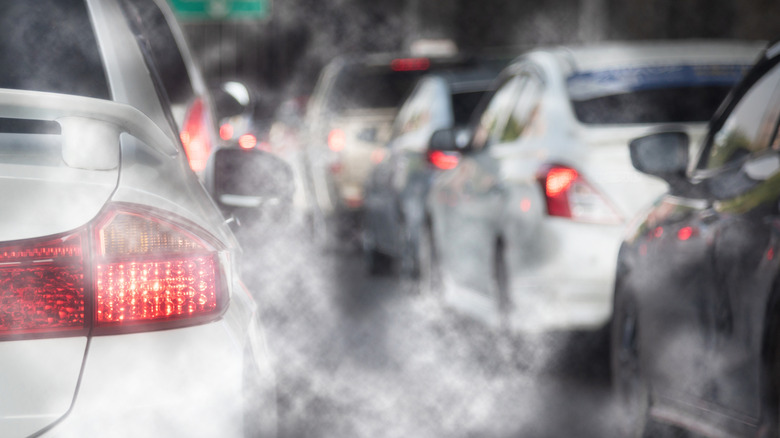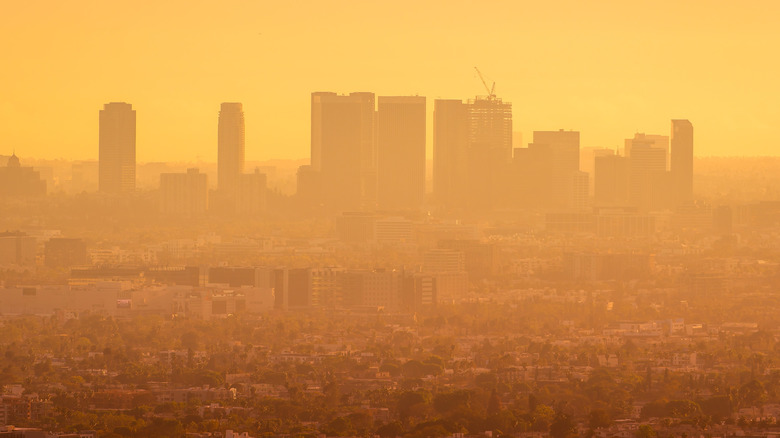Why Gas-Powered Cars In The US Don't Have Particulate Filters (But Diesels Do)
One way car manufacturers can reduce their vehicles' harmful emissions is through particulate matter filters. Particulate matter refers to the most common and harmful mixture of pollutant chemicals emitted by car and truck exhausts, usually in some combination of soot, smoke, dust, and liquid droplets. In particular, ultrafine particulate particles, those with a diameter less than 2.5 micrometers are especially dangerous to human health, as their microscopic size allows them to penetrate the lungs and bloodstream. According to a study by the Lancet Commission, these microscopic particles are responsible for roughly 95% of the world's pollution-related health problems. In a gas-powered vehicle, a particulate filter is a ceramic honeycombed filter downstream from the catalytic converter that traps and burns off harmful chemicals. For diesel and petroleum-powered vehicles alike, filters can reduce particulate matter emissions by more than 90%.
The problem is that gas vehicles are no longer beholden to the particulate matter standards necessary to combat the prevalence of these harmful chemicals. After much was made over the toxicity of diesel exhaust, regulators required diesel vehicles to meet standards that, in practice, necessitated filters. Inversely, gasoline cars exist in a regulatory gray zone,in which fuel efficiency standards have not forced the inclusion of particulate filters, creating a gap that researchers previously predicted would see U.S. gas-powered cars emitting 1.6 septillion pollutant particles over the next decade.
A history of particulate matter regulation
Since 1970, the Clean Air Act has empowered the federal government to set national vehicle pollution standards. In the following half century, the EPA has used the act's National Ambient Air Quality Standards to regulate particulate matter levels. According to the NRDC, particulate matter pollution has nearly halved since the Clean Air Act's 1990 amendments expanded the federal government's control over national emission standards. Following a series of new regulations, diesel engines now produce far less particulate matter than at the turn of the century. Crucially, these rules served as a de facto diesel particulate filter requirement, as filters were the most cost-effective way for manufacturers to meet these standards. According to the EPA, by the beginning of the next decade, diesel particulate matter pollution will have plummeted by 90% since 2005.
The opposite has occurred, however, for their gas-powered counterparts. In fact, diesel-powered vehicles now produce less particulate matter than gas ones in the United States, complicating the debate over whether diesel or gasoline causes more pollution. There are several reasons for this, but one major contributor is how the U.S. crafts its emission standards. Broadly speaking, EPA and NHTSA rules have emphasized fuel efficiency ratherthan ultrafine particulate matter, thus enabling manufacturers to forgo adding particulate filters. This sharply contrasts with standards in places like Europe, India, and China. According to a 2022 study by Emission Analytics, European models fitted with particulate filters emitted 83.7% fewer particles than their American opposites. Related to this is the rise of the gasoline direct fuel injection engine, which, although fuel efficient, actually increases particulate matter emissions. The results have been disastrous for pollution-reduction efforts,as a 2025 American Lung Association report found that 156 million Americans — roughly half the population — suffer from unhealthy air pollution.
Future outlook
The fight to reduce car emissions took a turn in March 2025, when the EPA repealed 31 Biden-era regulations, including the Multi-Pollutant Emissions Standards aimed at reducing criteria pollutants caused by new gas-powered vehicles, like hydrocarbons, nitrogen oxides, and, importantly, particulate matter. The repeal raises acceptable particulate pollution levels by 25% to 12 micrograms per cubic meter and returns a standard that caused expertsto dub particulate matter America's "silent killer". According to a 2021 study by McGill University, ultrafine particulate pollution causes 4.2 million deaths globally every year, including 50,000 in the United States. Researchers at the University of Minnesota, for their part, estimated that America's death toll was double this number.
California is instructive of the standard's ineffectiveness. Despite enforcing the reestablished national standard since 2002, the state is consistently one of the nation's most polluted. This is largely due to a transportation sector that accounts for roughly 40% of its air pollution despite regulations targeting pollution-heavy diesel trucking, shipping, and locomotive industries. Although in place for over two decades, 23 California counties cannot meet the reinstated standard. This is hardly surprising, as the American Lung Association credits California with five-sixths of the nation's most polluted cities.
Despite these challenges, a 2024 UC Berkeley study found that California reduced its particulate matter pollution by 65% since 2000.Unfortunately, these improvements occurred largely along racial and economic lines, with Black and Hispanic Californians suffering from greater pollution levels. To make matters worse, California's landmark zero-emission vehicle legislation was overturned by the U.S. Senate in May 2025, forcing the state to find new avenues to combat its mounting pollution crisis. Could a gasoline particulate filter mandate be a creative solution for the environmentally progressive state? Perhaps it should be.


